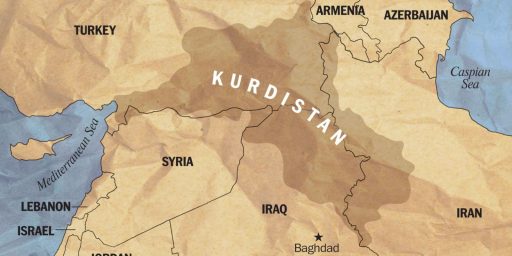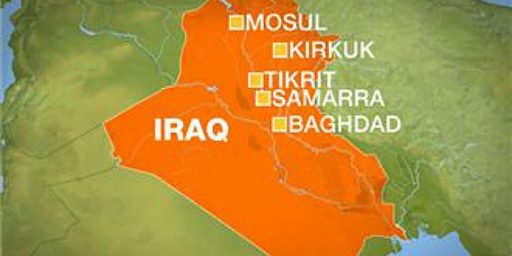Kurds Threaten To Walk Away From Iraqi State
NYT — Kurds Threaten To Walk Away From Iraqi State [RSS]
A crisis for the new Iraqi government loomed Tuesday as Kurdish leaders threatened to withdraw from the Iraqi state unless they received guarantees against Shiite plans to limit Kurdish self-rule.
In a letter to President Bush this week, the two main Kurdish leaders, Massoud Barzani and Jalal Talabani, wrote that the Kurds would “refrain from participating in the central government” in Baghdad if any attempt was made by the new government to nullify the interim Iraqi constitution adopted in March.
Shiite leaders have said repeatedly in recent weeks that they intend to remove parts of the interim constitution that essentially grant the Kurds veto power over the permanent constitution, which is scheduled to be drafted and ratified next year.
The Shiite leaders consider the provisions undemocratic, while the Kurds contend they are their only guarantee of retaining the rights to self-rule they gained in the past 13 years, protected from Saddam Hussein by United States warplanes.
In their letter, Mr. Talabani and Mr. Barzani wrote that the Kurdish leadership would refuse to take part in national elections, expected to be held in January, and bar representatives from going to “Kurdistan.”
That would amount to something like secession, which Kurdish officials have been hinting at privately for months but now appear to be actively considering. “The Kurdish people will no longer accept second-class citizenship in Iraq,” the letter said.
One of the things I took as a given going into the war was that the post-occupation government would have a strong federal, if non confederal, flavor. Given that Iraq’s borders, like most in the Middle East, were drawn by colonial powers without regard to the ethnic composition of the population, the need to give substantial autonomy to the Shi’a, Sunnis, and Kurds is rather obvious. Otherwise, we have the classic situation in Third World politics where “the election is a census.” In this case, the Shi’a will be virtually guaranteed to dominate the political landscape. That’s simply unacceptable to the Sunnis and, especially, the Kurds. If the final constitution doesn’t rectify this, civil war is all but assured.






On the other hand, Kurds are represented in ancestral areas that cut through Iraq, Turkey and Iran. Autonomy for Kurds in Iraq will create pressures and instability in both Turkey and Iran, and therefore across the region, like ripples in a pond. The Kurds have already suspended any guarantees to remain peaceful with the Turks and there has been some conflict. If this continues, it will invite a strong Turkish military response. Also, if the Kurds are granted control of the Karbala oil fields, this will leave them with inordinate economic power at the expense of the Sunni’s who are also seeking this resource. The outcome will of course be conflict and, again, instability (which will always threaten wider conflict). Add to this the fact that Sistani, although clearly, “moderate” in his approach, is fairly unbending on the point of granting Kurds any kind of autonomy. There is still room for diplomatic compromise, especially if the political momentum behind a sovereign Iraqi government can be built (forcing all to “trade horses” rather than fight).